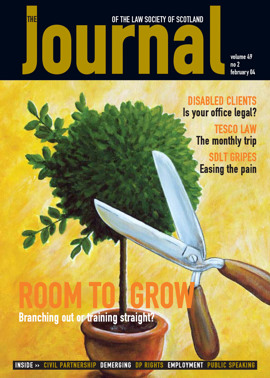Fee sharing: making the rules work
The Solicitors (Scotland) Practice Rules 1991 prohibit solicitors from sharing “with any unqualified person any profits or fees or fee derived from any business transacted by the solicitor of a kind which is commonly carried on by solicitors in Scotland in the course of or in connection with their practice”, with certain limited exceptions. Those exceptions are, broadly, retired partners and their executors, heirs or representatives; clerks or assistants who are wholly employed in the solicitors’ firm; public officers in respect of work done in the course of their duty; and other lawyers – including lawyers in other jurisdictions – and law centres. The Professional Practice Committee has recently undertaken a review of the practice rules particularly in the light of developments in England and Wales which were briefly referred to in last month’s Journal (page 40).
The Law Society (of England and Wales) have proposed changes to their similar rules which would allow solicitors to enter into fee sharing arrangements which (a) facilitate the introduction of capital; (b) facilitate the provision of services to the practice; (c) pay for referral of business except for criminal court work. The provisions are not unfettered and multi-discipline partnerships will continue to be prohibited. Solicitors will require to supply details of all such arrangements, and the percentage of the annual gross fees of the practice which has been paid to each fee sharer, to the Law Society; solicitors will require to disclose to the client any referral arrangement involving payment by the solicitor to a third party; and such an arrangement should not compromise the solicitor’s independence or impose any constraints or conditions which affect the client.
In its review the Society’s Professional Practice Committee came to the conclusion that the Scottish practice rules should not be amended but that this article should be published to advise the profession in Scotland of how the Committee interpret the practice rules with particular regard to arrangements which would be regarded as breaching the rules and arrangements which would not.
The Committee take the view that the principal type of arrangement which the practice rules prohibit is an arrangement to pay commission for the introduction of business on a case by case basis. Solicitors are entitled to pay for the cost of marketing or promoting the practice. They are entitled to pay a fee to be included on a panel to whom referrals will be made provided that that fee is not expressed as a specific sum per referral or as a percentage of the fees chargeable for referred business. A flat fee is not in breach of the rules and that may be a fee which is reviewed periodically.
Solicitors in Scotland are entitled to pay for the provision of services to the practice. To that extent the rules are not interpreted literally, as on one view the rules would prohibit the payment of rates and utility charges out of the firm’s fee income. That is not how the rules are interpreted. Even if the service is provided by the person who introduces the client, solicitors are entitled to pay for the service. However the service must be a real service and not merely the introduction of the client. The Committee have also decided that the carrying out of a money laundering check by the introducer would not be a service for which payment could be made as that is an obligation on solicitors themselves in terms of the Accounts Rules. Services which have been accepted as not breaching the rules have included carrying out hearing tests; taking statements of witnesses; obtaining photographs of a locus; and completing a detailed client questionnaire relating to the particular matter in which the solicitor is instructed. The introduction of capital in return for a percentage of the solicitor’s fees would be regarded as breaching the practice rules, but the provision of loan funds with a variable rate of interest expressed as a percentage of the funds advanced would not.
The inclusion of a commission paid to an introducer as an outlay in a solicitor’s fee note – and not a hidden part of the fee – would not be in breach of the rules.
Finally solicitors are of course entitled to receive commission from third parties for the introduction of business, but the existence of such arrangements should be disclosed to the client although the actual amount of commission does not need to be disclosed unless the client specifically seeks that information. Such commission received must relate to any work undertaken by the solicitors in connection with the business referred. If no work has been undertaken, unless the commission is of a nominal amount it should be accounted for to the client.
Bruce Ritchie, Director of Professional Practice
In this issue
- It's a funny old world
- Making the ends of justice meet
- Training for growth
- All the grocer's grandchildren
- Radical change or a lie in law?
- Costing the job
- Are you listening?
- Much ado about nothing?
- Demergers and continuing cover
- Bond with the audience
- Many roles, one team
- Fee sharing: making the rules work
- On sentencing
- Credit reform by instalments
- Scottish Solicitors' Discipline Tribunal
- Show us the evidence!
- A new era for farm tenancy law
- Fathers' rights: a new UK postcode lottery?
- Parallel imports: putting on the brakes
- Website reviews
- Book reviews
- SDLT 1: Over the obstacle course
- SDLT 2: Personal presentation
- The new law of real burdens
- Housing Improvement Task Force






